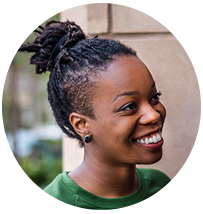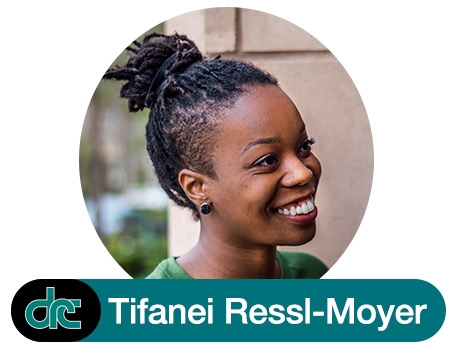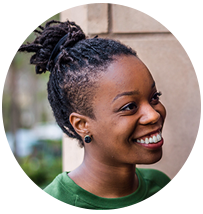DRC Attorney Profile: Tifanei Ressl-Moyer

DRC Attorney Profile: Tifanei Ressl-Moyer

Tifanei Ressl-Moyer

Tifanei Ressl-Moyer is a staff attorney at Disability Rights California. Her work focuses on reforming systems that neglect and abuse individuals with disabilities. She uses intersectional theory to insert racial and gender justice into the disability rights framework.
We spoke to Tifanei about pursuing a career in criminal justice and disparities within the criminal justice system when it comes race and disability.
Why did you decide to become an attorney?
From a neutral and, perhaps, geeky perspective, I simply—really—enjoy spending time researching, writing, and developing creative solutions with the use of a keyboard and pen. The practice of law is perfect for me in that way.
I am fascinated with how the quality of our individual lives and efficiency of our society is dependent on how people in power interpret and apply the language of the law. As a Black woman, I am keenly aware that the laws of the United States of America have dually served to justify both the enslavement of and the liberty of my ancestors. I became an attorney to use our system of laws to further the liberation of all people.
How does the intersection of race and disability affect treatment of/for inmates?
The intersection of race and disability affects the treatment of people who are incarcerated in a myriad of ways. People of color with disabilities are not only more likely to be arrested and incarcerated, they also face heightened risks of harm in prisons, jails, and juvenile facilities. Studies have shown that we are more likely to be victims of abuse, subjected to solitary confinement, denied essential medical or mental health care, and to receive punitive sanctions rather than rehabilitative interventions.
What were the major takeaways from monitoring the Fresno County Juvenile Justice Campus?
In this country, many states have built a juvenile justice system that does more harm than good. It’s based on fears rather than evidence-based practices. But the tide is changing. In Fresno, I learned that despite the real and, at times, imagined challenges of treating youth with disabilities who have interacted with the juvenile justice system, there is leadership in juvenile halls who really want to do the right thing.
We made a number of recommendations to the leadership at Fresno Juvenile Justice Campus designed to protect youth with disabilities from discrimination and custodial practices that place them at risk of harm. Since our last communications, the leadership made a commitment to adopt some of our recommendations. There is still a lot of work to do in Fresno and in California, but if we center the needs of young people who have to navigate the systems we created for them, we can get to a place where our children are safe and treated rather than harmed and punished.
What’s your involvement with Mays v. County of Sacramento? Why is this case important?
I got involved with Mays v. County of Sacramento in late 2016. At that time, Disability Rights California and its co-counsel, Prison Law Office, began investigating the conditions of the jail and entered structured negotiations with the county. The negotiations eventually broke down and we filed our complaint in July 2018.
I am the only plaintiffs’ attorney on this case who lives and works in Sacramento at this point. Therefore, I am the primary contact for most of our clients. I have spoken to hundreds of people in the jail over the last two years. I believe I am also the only plaintiffs’ attorney on this case who has had multiple family members in the Sacramento County jail. This fact should not be surprising when you consider that one-in-three Black men in the United States will spend time in jail. When I tour the jail and see the faces of our clients enduring the trauma of the unconstitutional jail conditions, their faces remind me of my own blood and my family’s own trauma. The safety of people who are incarcerated is very personal to me.
On a larger scale, this case is important because Sacramento County jail houses nearly four thousand people on any given day, including hundreds of people with disabilities. Each of the people in the jail have their own families and communities that they belong to and who are affected by their incarceration. Ensuring that people in the jail have adequate care is a necessary step toward healing Sacramento and other California communities from the effects of mass incarceration on people of color with disabilities.
Why is it important to bring attention to disparities within the criminal justice system when it comes race, disability?
We often speak of issues of criminal justice, disability justice, and racial justice in the abstract. But the impact of disparities within the criminal justice system are very real to thousands of people throughout our state and millions within the country. We must speak about the disparities in order to make meaningful progress to an equitable society that values human beings in all of our different forms.








